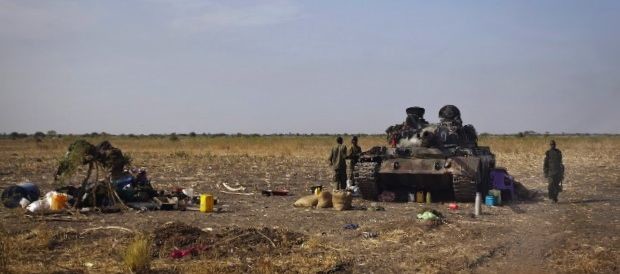South Sudan’s second largest city is again abandoned by its inhabitants as fighting raged there Tuesday for the second time since the start of the conflict in the country a month ago.
According to witnesses near Malakal, aid organizations working inside the UN base, and UN peacekeepers, the fighting started around 7:30 a.m. and seemed to involve heavy weapons such as tanks, artillery and mortars.
UNMISS, the UN Mission in South Sudan, reported “heavy fighting between pro- and anti-government forces in Malakal,” the spokesman of the United Nations announced at a regular press briefing on Tuesday in New York.
“The fighting began early on Tuesday morning in the vicinity of the UN base, with combatants reportedly using heavy machine guns and tanks,” said the UN spokesman.
“Stray bullets are reported to have landed inside the UN base, wounding internally displaced people who had sought shelter there,” he added, explaining that dozens of wounded people were taken for treatment to the hospital inside the UN base.
According to a witness on the opposite bank of the Nile, heavy guns thought to be artillery were being used at the airport north of the city.
Claiming an empty city
Owing to the ongoing violence today it was too early to report which side controlled the city, but spokesmen of both the government and the rebels claimed the city.
Lul Ruai Koang, the opposition’s military spokesman, said this afternoon in Addis Ababa, “I’ve just received a confirmation from our field commander: the SPLM/SPLA forces under the direct command of Major General Gatwich Gatkuoth have recaptured the strategic town of Malakal.
“Our forces are still pursuing Salva Kiir’s forces towards Akoka north of Malakal,” he said. Asked whether they were actually controlling the whole city, Koang insisted that they had “complete” control.
Michael Makuei, the government spokesman, also speaking in Addis Ababa where talks are ongoing over a potential ceasefire, said the claim by Koang was “baseless and unfounded.”
He claimed the attack was repulsed and the rebels were on the run. Makuei noted that the attackers on Malakal today were armed civilians mobilized in Nasser and Maiwut counties.
Sanitation problems at UN camp
As a result of Tuesday’s violence, the number of people seeking refuge at the UN base in Malakal nearly doubled to 20,000. The base is defended by just under 1,000 UN peacekeepers.
Heather Blackwell, country director of Danish Refugee Council said, “this huge increase of people further strains the limited water and sanitation facilities inside the camp and availability of food.”
“DRC has undertaken an immediate camp clean-up operation designating areas for defecation (as latrines are limited) and paying for bags of human solid waste to improve general conditions and reduce spread of disease,” she said in an e-mail quoted by Reuters.
The organization has paid residents the equivalent of $1 per bag to collect the waste. Thousands of the bags are being loaded onto trucks to be taken away and burned. However, for the time being the trucks remain parked inside the base because of the fighting.
Another NGO working in the sanitation sector, Oxfam, said that even before the new influx of nearly 10,000 people they were already “struggling” to provide enough latrines.
Oxfam country director Jose Barahona told Reuters that they were planning to send sanitation experts to Malakal on Wednesday but this now looks unlikely. Tuesday’s daily UN flight to Malakal was suspended because of the fighting.
Less than 200 latrines had been built in the base before the latest influx of people, which means that presently there is only one latrine for every 100 people, approximately.
“The open defecation areas will be very crowded and there is the risk of people getting sick,” said Barahona.
Related coverage:
Damage assessment to look at ‘huge losses’ in aftermath of Malakal looting (8 Jan.)
Photo: A tank on the outskirts of Malakal, 31 December 2013 (AP/Ben Curtis)




